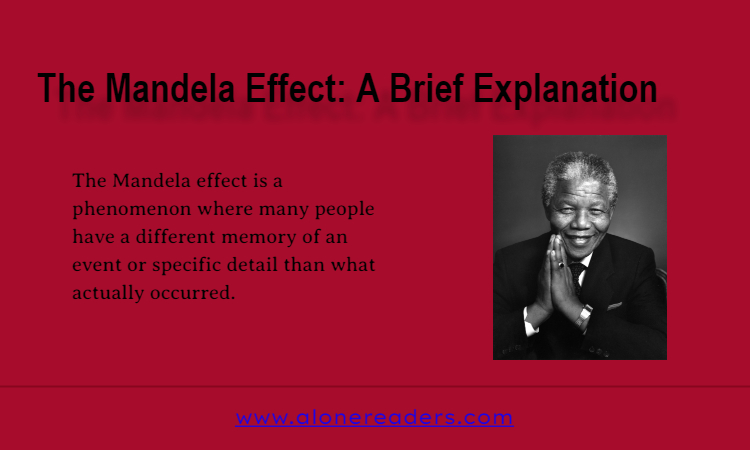
The Mandela effect is a phenomenon where many people have a different memory of an event or specific detail than what actually occurred. When many people believed Nelson Mandela had died in jail in the 1980s when in fact, he had been released in 1990 and survived until 2013, Fiona Broome, a paranormal consultant, invented the term "Mandela effect" in 2010.
In internet forums, the Mandela effect has gained a lot of attention as people share examples of incidents or details that they recall differently from how they actually happened. The Mandela effect is often shown by:
People remember that the Monopoly man's monocle was black rather than white
People remember the well-known quote from the film "Forrest Gump" as "Life is like a box of chocolates," when it should have been "Life was like a box of chocolates."
The Mandela effect has been explained in a variety of ways. Some people think the incident is proof that there are parallel worlds or alternate realities, where things happened differently than they did in our reality. Others contend that the Mandela effect is a product of collective false memories, in which people have differing memories of events or particulars as a result of outside influences like media coverage or social media.
The phenomena of confabulation, in which people fabricate memories to fill in blanks in their memories or to complete missing information, is one explanation for the Mandela effect. A number of causes, including the passage of time, the influence of ideas, or the influence of outside factors like media coverage, might cause this.
The phenomenon of memory conformity, in which people's memories are influenced by the experiences of others, is another explanation for the Mandela effect. This might happen when people talk about specific details with others and start to doubt their memories, or when they come across information that conflicts with their memories.
The Mandela effect is still a puzzling and unsolved phenomenon despite the many theories that have been put out for it, and further investigation is required to properly comprehend it. The Mandela effect highlights the frailty of human memory and the ways in which it can be impacted by outside forces, even though it may not represent proof of parallel universes or alternate realities.
Final Word
The Mandela effect has been explained in a variety of ways, including by the concepts of confabulation and memory conformity, but it still remains a mysterious and unexplained phenomenon. The Mandela effect highlights the weakness of human memory and the ways in which it can be impacted by outside forces, even though it may not represent proof of parallel universes or alternate realities.